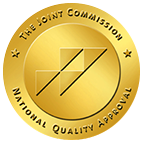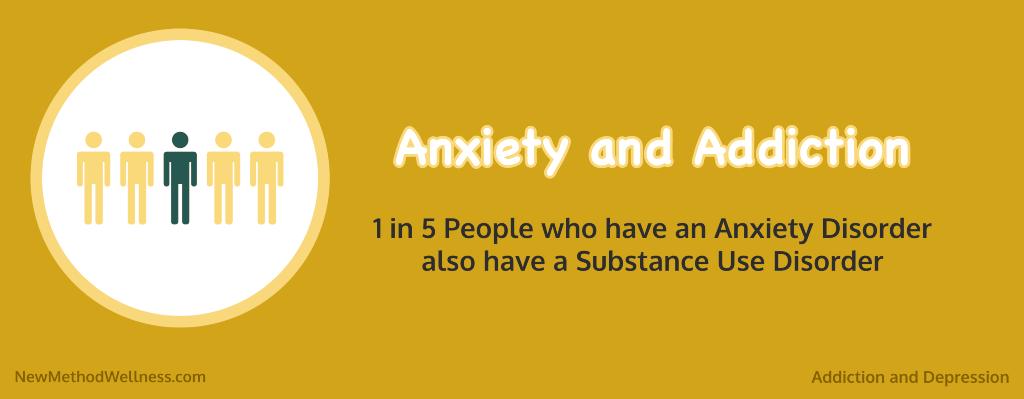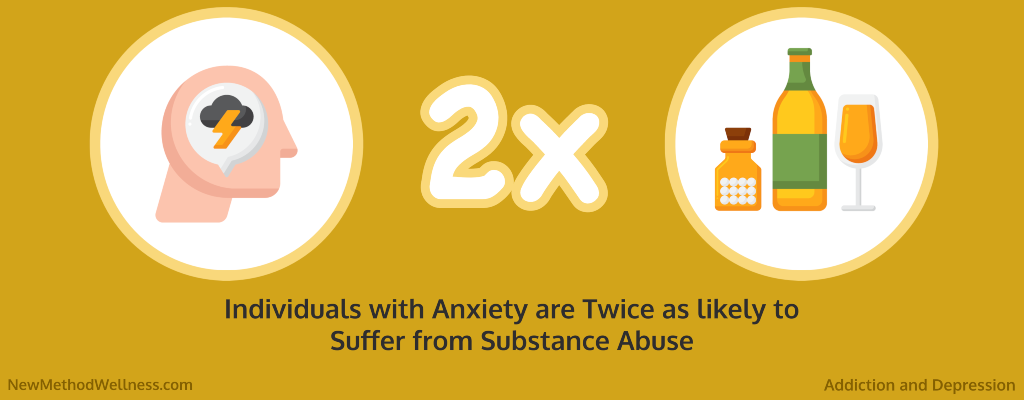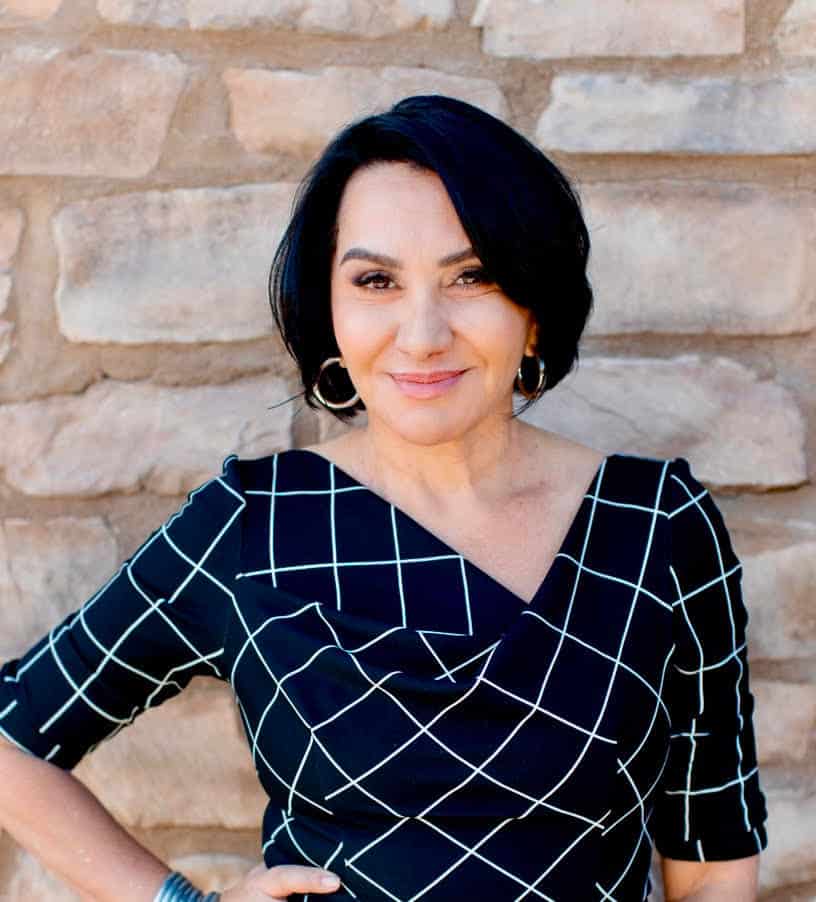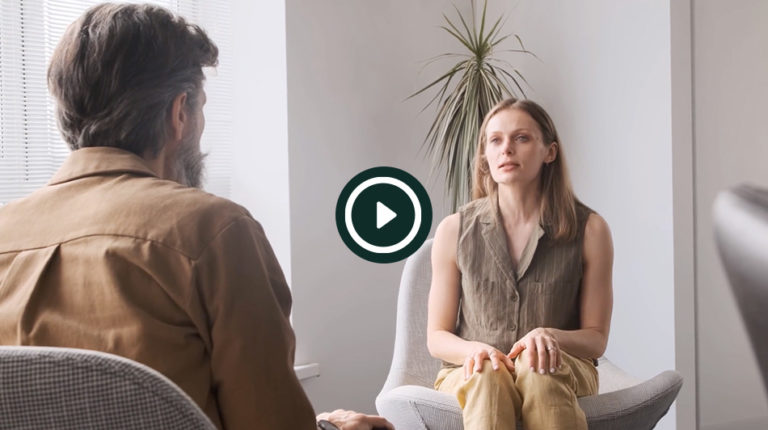
DUAL DIAGNOSIS: Addiction and Anxiety



Table of Contents
The Connection Between Addiction and Anxiety
The combination (or comorbidity) of Anxiety and Addiction is also more common than you might think. Twenty percent of people in the United States with an anxiety or mood disorder also have a substance use disorder. Similarly, an estimated twenty percent of those with a substance use disorder also have anxiety or a mood disorder.
Chronic feelings of anxiety can lead a person to self-medicate with drugs or alcohol. Certain anti-anxiety medications (Benzodiazepines) are also highly habit-forming and can be abused. Similarly, people who are dependent on drugs and alcohol can have abnormal responses to stress. The symptoms of withdrawal from drugs and alcohol can elevate these stress responses into a debilitating feeling of impending doom.
This phenomenon can play out as a negative feedback loop of endless psychological and physical symptoms. However, recovery is possible. Dual Diagnosis treatment professionals can help break this cycle.
Types of Anxiety Disorders
To better understand anxiety, and why it occurs, it helps to understand the different kinds of anxiety. Here are the differences between anxiety disorders and what their symptoms are:
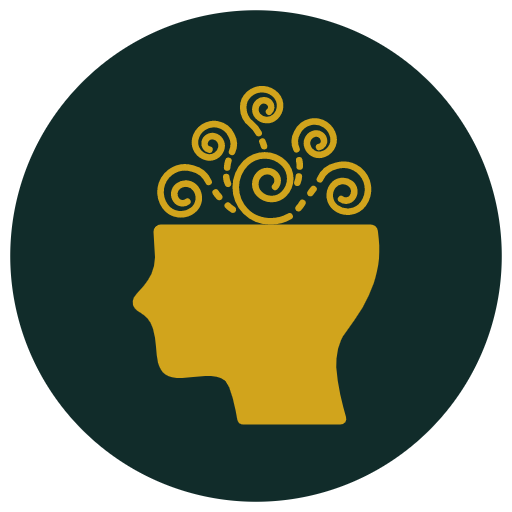
Generalized Anxiety Disorder
General Anxiety Disorder (GAD) differs from common feelings of everyday anxiety. People with GAD often have unwarranted levels of excess anxiety for a given situation.
General Anxiety Disorder is often accompanied by a constant state of worry, dread, and impending doom. These feelings can become so debilitating that they negatively impact a person’s ability to function in their daily life.
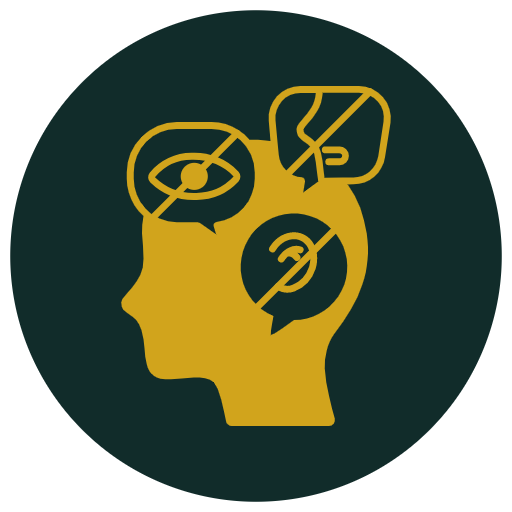
Social Anxiety Disorder
Having a fear of socializing or going into crowded, public places can be a symptom of Social Anxiety Disorder. People with Social Anxiety Disorder often fixate on how conversations will go. They may be consumed by fear that they will be judged or otherwise appear foolish in other people’s eyes.
These feelings of self-consciousness and embarrassment can impede a person with Social Anxiety Disorder from engaging in social situations through avoidance behavior.
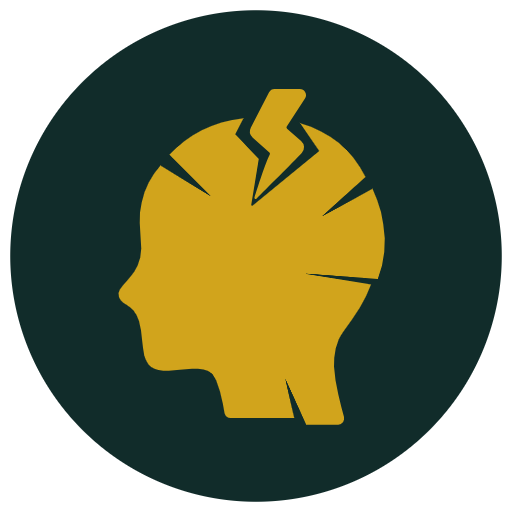
Post-Traumatic Stress Disorder
Post-Traumatic Stress Disorder (PTSD) often goes undiagnosed. PTSD is often associated with veterans and survivors of sexual abuse. However, it is not limited to these circumstances. Trauma can manifest in many circumstances. Trauma is also subjective.
Any trauma can have a lasting effect resulting in PTSD. Physical abuse, emotional neglect can be triggers. So can watching a parent struggle with their own mood or substance use disorders.
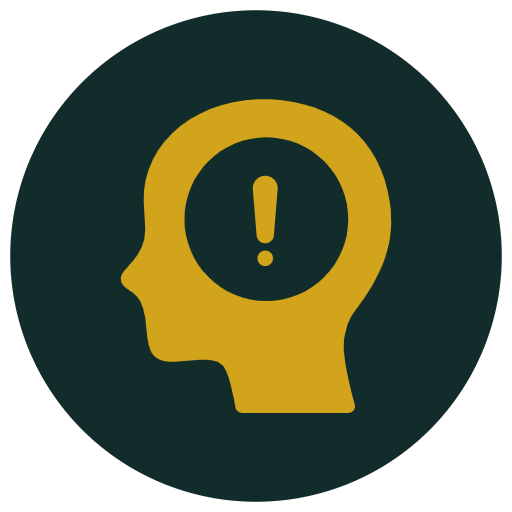
Panic Disorder
Panic disorder is similar to General Anxiety Disorder but with heightened emotional responses. Panic disorder is characterized by feelings of impending doom, like death or something drastic is going to happen.
People who have panic disorder can be stricken with paranoia. Intense physical symptoms such as panic attacks, hyperventilation, and dizziness can occur as physical manifestations of the disorder.
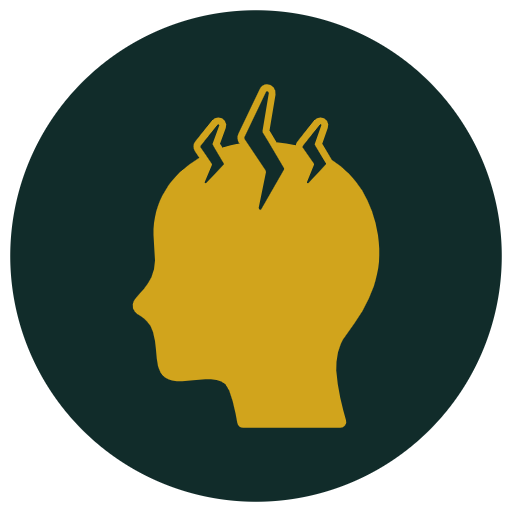
Phobias
Phobias are specific to certain objects or situations. Phobias are an irrational condition. The person associates whatever object or situation with doom. Thoughts of death or other terrible fates occur when in contact with these objects.
Phobias, like other anxiety disorders, disrupt the diagnosed person’s daily life. They may feel the need to go out of their way to avoid their phobias.
Common Symptoms of Anxiety
Symptoms can overlap between different disorders. Here are some common symptoms that occur in many anxiety disorders.
- Intrusive Thoughts
- Substance Use to Seek Relief
- Isolation
- Shortness of Breath
- Shakiness and Trembling
- Paranoia or Delusions
Unprocessed Emotions and Inflammation Behind Anxiety
Recent studies suggest that Anxiety may be a result of inflammation. Inflammation has had a direct impact on the regions of the brain associated with anxiety. Reducing inflammation can reduce the distress caused by anxiety. A change in lifestyle and diet can reduce inflammation.
Holistic treatment for substance use and anxiety aims to treat the disorders’ underlying emotional, mental, physical, and spiritual aspects. Addressing the underlying unprocessed emotional trauma goes a long way in treatment.
Anxiety disorder is a way for the body to express to the brain that something is not operating optimally. Individualized approaches help identify the root causes of addiction. Addressing these issues is the best way to work through them to find a way of how to treat anxiety.
How Addiction and Anxiety Interact
Substance use manifests as a result of similar causes as anxiety disorder causes. Inflammation, trauma, and unprocessed emotions impact a person’s likelihood of becoming an addict. Then, if a person is experiencing anxiety or other mood disorder, they may attempt to self-medicate through drugs or alcohol. Dependency on these drugs occurs, even though they make the mood disorders worse.
Instead of focusing on clinical or untraditional methods for coping with anxiety, substance use takes shape. For example, a person may want to take drugs to ease anxiety in social settings or seek relief in their daily life. Sometimes substance use occurs before an anxiety disorder occurs. In this case, it can end up in the development of an anxiety disorder. Many drugs, including common, legal drugs such as caffeine and nicotine, cause anxiety.
An increased experience of anxiety will cause the sufferer to seek further relief. Thus, a toxic cycle of drug abuse and anxiety begins.
Causes of Substance Use and the Similarities to Anxiety
The causes of substance use are actually similar to what makes mood disorders develop in the first place. These similar causes, of course, do not include relief from anxiety or mood disorders themselves. People may need relief from their negative thought loops or bodily inflammation.
Many traumatic incidents can cause the onset of substance abuse. Substance abuse is an attempt to find calmness in mind, body, and spirit. Drugs that bring on a sense of euphoria or dissociation from reality only bring about a temporary, illusory reduction of symptoms.
Feelings of abandonment, grief, fear, anger, and hurt result in addiction. The addict does not dig deeper or releases and feels this pain. They instead numb the pain and hurt.
This can be a conscious or unconscious process. Most of the time, the pain an addict seeks relief from is unconscious. The addict may not be aware of the more serious emotional damage behind their thoughts, behaviors, and motivations.
The feeling of something missing, inability to process emotions, or apathy can make someone hurting reach for drugs instead of feeling their pain. Approaching your hurt through a means to love yourself has a profound effect on treating disorders. Energy is emotions in motion. Repressing or suppressing emotions leads to both a build-up in pent-up energy or unreleased emotions. Anxiety is a building up of emotions.
Repressing or suppressing emotions leads to drug use to numb the effect from an overwhelming amount of emotional turmoil in the body.
Repression Versus Suppression
Repression is an unconscious decision to block unwanted thoughts, impulses, and memories. This occurs when memories are too traumatic to address.
Suppression is the deliberate, conscious intent to disregard unwanted thoughts, impulses, and memories.
Anxiety and addiction stem from the repression of experiences. Repression manifests as these disorders and their physical symptoms. Relief from anxiety is sought out through substance use. Substance use is an active form of manifested suppression.
Conclusions on Addiction and Anxiety's Relationship
As you can see, addiction and anxiety both perpetuate each other. They are also caused by similar reasons.
Anxiety and substance abuse are coping mechanisms. So are other defense mechanisms the brain takes on to protect itself from trauma. Environmental and genetic factors influence which coping mechanisms an individual will use.
Anxiety often makes a drug addiction overlook their addiction. The investment into drug addiction often makes the anxiety experiencer overlook their anxiety. It’s easy to think your relationship with drugs is helping your relationship with anxiety when you are in an anxiety-induced addiction mindset.
Substance use and anxiety both stem from similar places. Integrating their treatment together obtains the best results.
How to Treat Addiction and Anxiety
There are many routes one can take to treat their anxiety and substance use. An individualized approach works best. For some, traditional pharmaceutical methods work best. For others, Traditional Chinese Medicine works.
The point is, everyone needs different addiction treatment. Finding a place that will focus on what you need to address your underlying subconscious tendencies is rewarding. However, it does take an initial time investment.
Considering many factors is necessary to get the right treatment. Here are a wide variety of treatments to consider.
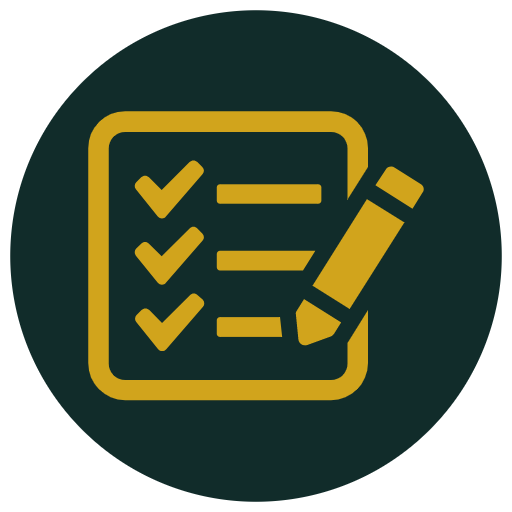
Pharmacogenetic Testing
You don’t have to take all kinds of medication under a trial and error test run. Pharmacogenetic testing looks at your individual genes and their likely reactions to medications. This process helps those who have not found relief through pharmaceuticals. This is a great option to understand the efficacy of all medication options.
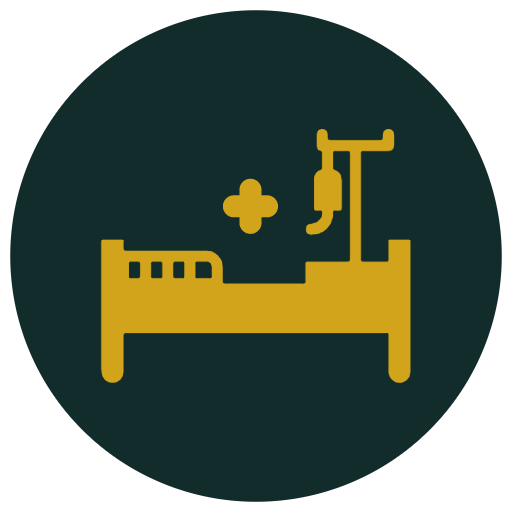
Drug and Alcohol Detox
Detoxing is the first necessary step to getting help. Identifying withdrawal symptoms is necessary before more treatment may occur. Detoxing is part of establishing a safe environment for addicts. Proper treatment cannot occur in unsafe physical conditions and symptoms.
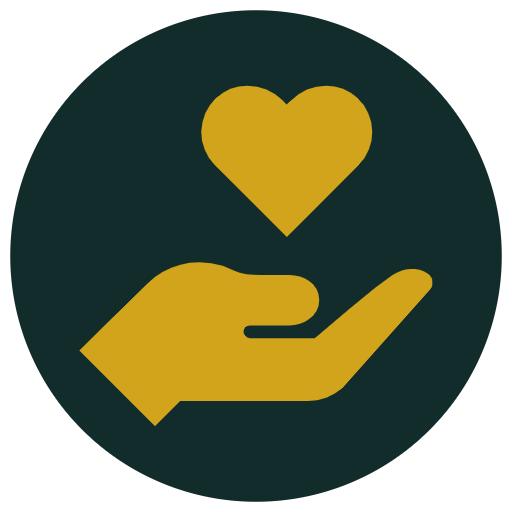
Trauma-Informed Care
Trauma-informed care allows patients to work with their clinicians to understand the cause-and-effect relationship behind their substance abuse. Having a better understanding of the traumas that led to these behaviors goes a long way in eliminating guilty feelings.
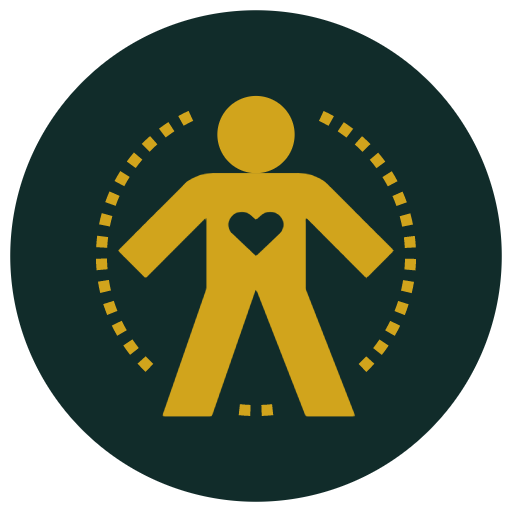
Holistic Therapy
Holistic therapy is a great option for people who are resistant to traditional and pharmaceutical methods. The holistic approach treats the individual as a total being. Their mind, body, and spirit are all considered.
Subsets of holistic therapy include but are not limited to wilderness therapy, art therapy, meditation, yoga, and hypnotherapy.

Nutritional Counseling
Nutritional counseling falls under holistic therapy. Nutritional counseling is important because addicts are not nourished.
Reintegrating proper nourishment aids in more benefits from other treatment addicts are undergoing. Nourishment is an overlooked issue that shouldn’t go neglected in the recovery process.
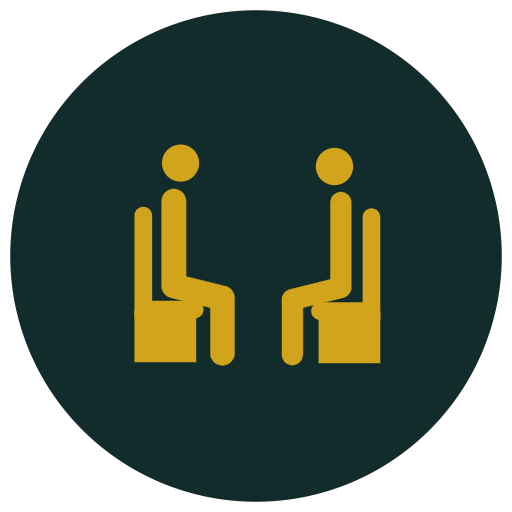
Cognitive Behavioral Therapy
Cognitive-behavioral therapy recognizes that repetitive thought patterns lead to behavioral cycles. Awareness is the first step to understanding behavioral patterns. Patients can understand their limited belief systems by developing greater self-awareness.
Having a better understanding of their limited beliefs lets them control their response to their thoughts. They can rewire their own thoughts by correcting negative thought patterns that don’t align with them.
Dual Diagnosis Treatment Takes Time
With all of these options and even more to consider, treatment takes time. It’s important to find clinicians who recognize this time investment.
Holistic approaches are great for this reason. They install strategies that the addict can use in their daily routines or when they become triggered.
Becoming more self-aware helps to stop anxiety and addiction in their tracks. Techniques that focus on this strengthen the relationship the addict has with himself. These techniques can be something like cognitive behavioral therapy or meditation.
Somewhere along the way, the addict severed their relationship with themselves. Bridging that connection is the only way to overcome their problems. Various methods can achieve this goal.
Help is Available
Don’t put off the severity of the situation any longer. If you or a loved one is experiencing anxiety and addiction, get help now.
The first step to self-improvement may be the hardest step. Taking that leap of faith is courageous. It shows that you love yourself despite your actions. Thought patterns saying otherwise do not state an accurate amount of self-love.
Learn to become yourself again. Learn to become better than yourself. You can be an even better version by implementing methods of how to treat addiction.
Contact New Method Wellness to start your individualized treatment program today.
Our Dual Diagnosis Treatment Centers
Handpicked by Dr. Phil, New Method Wellness is a premier dual diagnosis addiction treatment center dually accredited by The Joint Commission. It has been singled out as one of the best drug and alcohol rehab centers in America, offering a unique 3:1 staff-to-client ratio that pairs every client with two therapists instead of one.
At New Method Wellness, we add another dimension to dual diagnosis treatment, and that is the integration of holistic therapy, such as massage/acupuncture therapy, equine therapy, and art therapy. As addiction therapists and substance abuse counselors work with clients to treat the substance use disorder and the co-occurring illness associated with it, holistic therapy adds meaning to life after treatment and sustains long-term recovery. Our 3:1 staff-to-client ratio ensures client success after treatment, as evidenced by our Extended Aftercare program.
For more information about New Method Wellness’s treatment programs, call (866) 951-1824
Related Topics
Clinically Reviewed By:
Deanna J. Crosby, M.A., LMFT, LAADC, Psy.D. (C)
Deanna Crosby is a Licensed Marriage and Family Therapist (LMFT) with over 20 years of experience working with clients in recovery. Her expertise has catapulted her into the spotlight. Featured on several episodes of the Dr. Phil Show as a behavioral health expert, DeAnna is a routine contributor for NBC News, The Huffington Post, Elle Magazine, MSN, Fox News, Yahoo, Glamour, Today, and several other prominent media outlets.
After receiving her bachelor’s degree from the University of California in Irvine, Crosby did postgraduate work at Centaur University where she graduated at the top of her class with a CAADAC certification in Centaur’s chemical dependency program. Following her time at Centaur, Crosby received her Master of Counseling Psychology degree from Pacifica Graduate Institute, where she also attained a Doctoral Degree in Depth Psychology.
TAKE THE FIRST STEP
From all of us at New Method Wellness co-occurring treatment center, we wish you peace and serenity in knowing that you or your loved one will get the necessary help.
ACCREDITED BY:
